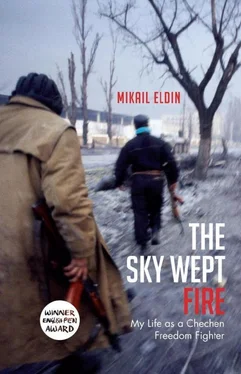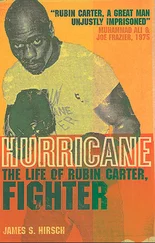The air-raid shelter is packed: there are wounded fighters and civilians. A military nurse runs over to you, and, true to her professional duty, draws out a small piece of shrapnel lodged near your ear. A few fighters leave the shelter; you follow them. People try to stop you, they’re saying something to you, pulling you back by the arms. But you smile at them and leave. You know the planes must have flown away, otherwise you would hear them. As for those people – well, you cannot hear them because they’re talking so softly. In any case, you are a fatalist. If your hour has come, then there’s nothing that can save you. You take a few steps and notice a fighter desperately waving his arms, trying to tell you something. You stop and look at him. He runs to a tall tree, continuing to gesture at you; you run after him, but don’t make it in time. You see an explosion. Yes, first you see it… Then the dull sound of a blast reaches you. No, not a missile… It is the powerful blast of a bunker-buster, a bomb specially designed to destroy enemy air-raid shelters. You are sure of this, because you’ve become an expert on bombs. It falls at the very spot you’ve just left. [25] In May 1995 this bunker-buster was dropped in Shatoy, killing more than fifteen civilians who were hiding in the bomb shelter.
In slow motion you see an enormous piece of iron come flying towards you. Desperate to move out of its path, you realize that you won’t make it. But for some inexplicable reason it doesn’t hit you. Later, a number of fighters swear that the blast wave flung you a good two metres, and you believe them only after measuring out the flight path of this chunk of iron blown from the second floor of a building. You come back to your senses as you jump through the window of a school standing a hundred metres from the air-raid shelter. Running into the school cellar and seeing the people there, you remember that there were also people in the air-raid shelter, and you run back… But it’s too late. It was already too late the moment the bomb slipped through the hatch of the plane. Almost everyone has died. Only a few have survived. There are mangled, bloodied beings covered in dust and black soot, who just a moment ago were humans. And wandering about in the silence, you realize it was destiny. You did not get out of your own free will – it was your time left on earth that got you out. You feel somewhat aggrieved. But wait… If it was fate, then where did you find this burning desire to confront the pilot of the plane face to face? Where has that come from? No, it’s not fury, not hatred: it’s something cooler and more powerful. A feeling which even you find frightening. You realize that the pilot must have known full well who he was bombing. The scum at the controls of the plane knew there were no combatants here. He knew because the Médecins Sans Frontières staff had sent official notification to the Russian command that this complex held only the wounded. And, as a rule, most of the wounded are civilians. They asked that these buildings which held the wounded be protected from air strikes and artillery fire. Yet the Russians chose to strike those very buildings – turning the doctors into unwitting forward air controllers. And you’re burning with a desire to find this pilot… And then what? You don’t want to think of the aftermath of such an encounter. But haven’t they bombed peaceful villages before? And anyway, aren’t you a fatalist? Yes, they’ve bombed villages. But maybe they bombed them by mistake. Whereas this time it was no mistake. This silence, this continuous roar of water stirs a strange fear in you. No, not the fear of bombs and bullets – in the hell of Grozny you learnt not to be too frightened of those; rather a fear of something more terrible still than the horrific deaths in the air-raid shelter. But you don’t know what is eliciting this fear. And then the fear gradually subsides and fades, though it will come back… Later it will return with more clarity… But you are a fatalist.
War is a strange phenomenon. Odd things happen during a war. If some souls who until then had been brothers-in-intellect find themselves plunged into long years of ardent hatred during a war, then other creatures, who could not possibly have been called kindred – at least in terms of species – become as close as brothers during the war and seek protection among each other. I remember how we found him wounded. A heavy 7.62 mm-calibre bullet from a Kalashnikov had pierced his wing, ripping out a small chunk of bone. He beat his wounded wing clumsily against the earth as my cousin and I gathered him up, wrapped him in a jacket and brought him home. He was a magnificent beauty of an eagle. He was badly injured and it was even suggested that we put him out of his misery, but my elder cousin Akhmed objected. The eagle wouldn’t let anyone near him, only allowing Akhmed to examine and bandage him, and that only after first pecking him in the head. Realizing that the eagle needed qualified care, I approached some doctors from Médecins Sans Frontières, whose chief I was acquainted with, and arranged to have him examined. The doctors put him to sleep and operated on the wounded wing. They treated him to some meat, and a young doctor took one of his feathers as a keepsake. I nicknamed the eagle Earl, and he would respond, or rather react, to this name. My God, how he yearned for the sky! After long and vain attempts to take flight, he would clamber on to an empty fuel drum and sit for hours staring at the sky. In the first few days another eagle came and circled the sky with an alarming call. One day, though, the wounded bird jumped up on to the drum and answered his circling comrade with a long, forlorn, pining cry. From that moment his comrade stopped coming. The only thing that would make Earl draw close to unfamiliar people was the whine of the Russian aircraft. Upon hearing the roar of approaching fighter-bombers, he’d run for his life towards humans and shelter among them. Experiencing a fear that was baffling to him, he instinctively sought protection from the only creatures able to give it to him. But humans could not shield him. Soon after, he was killed by shrapnel from a cluster bomb. When the young Frenchman who headed the Médecins Sans Frontières brigade learnt from me after the war that Earl had died, he showed me the feather he had kept and said, ‘This eagle too died defending the mountains in his own way.’
A few weeks later, the federal forces took Shatoy and Vedeno and the Chechen resistance retreated into the mountains, as their ancestors had done since time immemorial when outnumbered by the enemy. The fall of Grozny and the occupation of the Chechen plains hadn’t seemed like a tragedy – it was what happened whenever the enemy was too powerful. And the Chechens had always returned to the plain. But when the enemy army entered the villages of Shatoy and Vedeno, in the heart of highland Chechnya, people became dispirited, and some of the less resolute were seized with panic. For the highlands are Chechnya’s inner sanctuary, and while this sanctuary remains free of enemy soldiers, the Chechens are unconquered. Behind us we still had more mountains: Bamut, Yandi and Stary-Achkhoy were fighting on, and so the more tenacious kept up their spirits and prepared for new battles. But the Russian generals, rather than stepping up the assault, were celebrating their latest victory and doling out the awards and medals. They had, it is true, paid heavily for their victory. One Russian officer told me that after the fight for Shatoy they had to form an entire new motorized infantry regiment from a paratrooper brigade assigned to him. But who viewed these Russian Army casualties as a loss to the country? In response to the new situation, I joined a tactical intelligence team operating along this axis. I could, of course, be accused of flouting journalistic neutrality, but I had no reservations. I was fulfilling my civic and filial duty to the motherland, however grandiloquent that might sound. This war had stopped being ‘somebody else’s war’ on the night of the New Year’s Eve assault on Grozny. My starry-eyed excitement at the privilege of witnessing that first day of war had long ago given way to the cold cynicism of real combat. And that Chechen commander was a thousand times right when he smiled sadly in response to my self-assured words. A journalist can indeed take sides. And at certain moments in his life, he simply has a duty to act in the capacity of human being or citizen. Yet I never stopped being a journalist, neither then nor later. To observe impassively the destruction of your own nation is the lot of cowards, or outsiders with a homeland somewhere far away and at peace. But as subsequent events would show, I made a poor reconnaissance scout. Within just a few weeks I had committed a fateful blunder, in a clear demonstration of my reckless nature as a journalist.
Читать дальше












